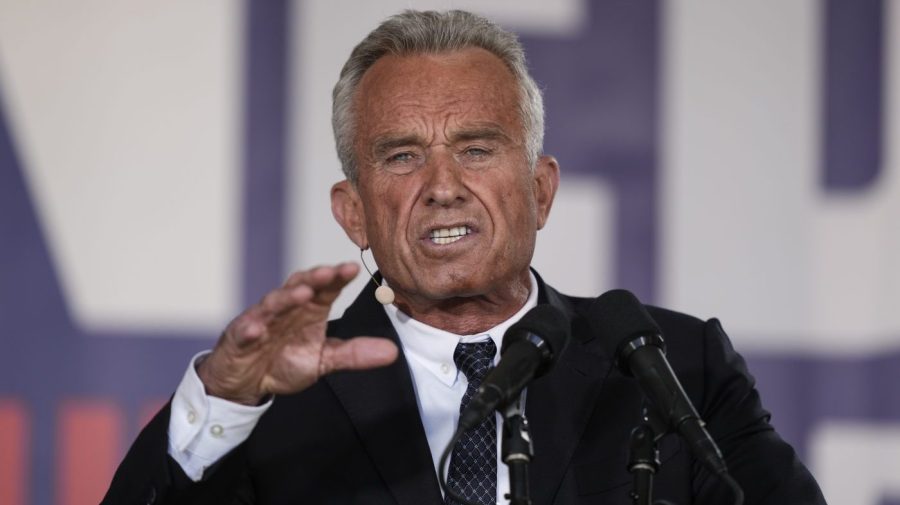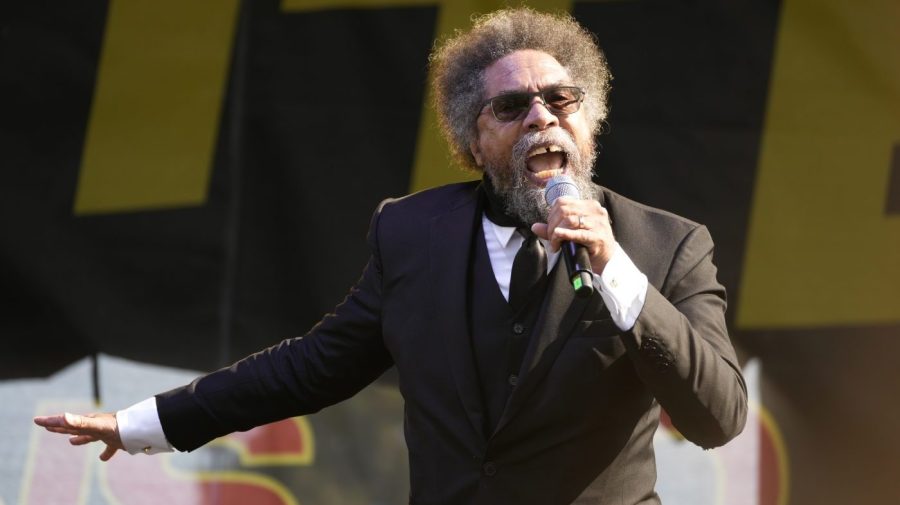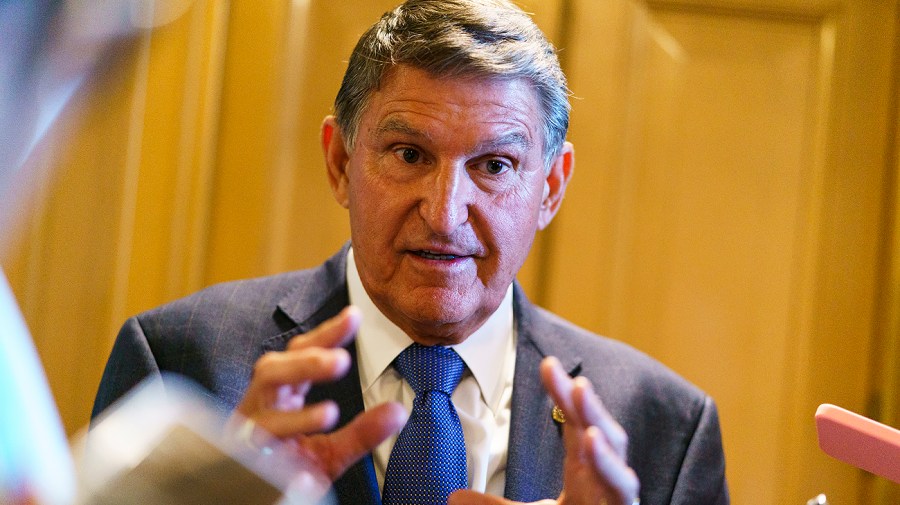4 alternative presidential candidates — and how they might impact the 2024 race

The 2024 presidential election field could be unusually crowded.
Right now, President Biden and former President Trump look likely to face off in a rematch of the 2020 election.
But there are at least three well-known names also in the mix: Robert F. Kennedy Jr., Cornel West and Jill Stein. They could be joined by a fourth, Sen. Joe Manchin (D-W.Va.), who sounded inclined to launch a third-party White House bid when he announced last week that he would not run for reelection to the upper chamber next year.
Here is a look at the four declared or possible candidates, and how they could change the race
Robert F. Kennedy Jr.

Presidential candidate Robert F. Kennedy, Jr. speaks during a campaign event at Independence Mall, Monday, Oct. 9, 2023, in Philadelphia. (AP Photo/Matt Rourke)
Kennedy is the candidate whose impact on the race may be the greatest — and the hardest to gauge in terms of its specific effect.
He began the 2024 cycle competing against Biden in the Democratic primary and got off to a strong start — buoyed, presumably, in part by having such a revered last name. But he plateaued in the polls and, on Oct. 9, launched an independent bid.
Recent polls have suggested that, in a three-way race with Biden, Trump and Kennedy, the scion of the famous family might take more voters from the Republican than from the Democrat.
A Quinnipiac University poll released Nov. 1 found Biden with only a 1 point lead over Trump in a straight head-to-head race but with a 3 point edge when Kennedy was included. Fourteen percent of Republicans were inclined to vote for Kennedy in that scenario, compared with 12 percent of Democrats.
During the period when Kennedy was still officially a Democratic candidate, data and polling site FiveThirtyEight noted that he consistently scored higher favorability ratings among Republican voters than among their Democratic counterparts.
It’s not that hard to discern why this might be happening.
Top Stories from The Hill
Kennedy’s deep skepticism of vaccines and his propensity to at least nod toward conspiracy theories are a fairly snug fit with Trump’s rhetoric and worldview. Like the former president, Kennedy often leans toward the idea that shadowy elites are conspiring against the interests of regular folks.
Similarly, Kennedy’s view of the war in Ukraine — essentially, that the West adopted an excessively belligerent stance toward Russia, including through the expansion of NATO — has more in common with Trump than Biden.
Kennedy’s shift from Democratic insurgent to independent candidate has also wrought a noticeable change in media coverage from some conservative media.
Sean Hannity, who at one point had praised Kennedy for his supposed support of “medical freedom,” during a later appearance pressed Kennedy aggressively on what the host termed “as pretty liberal of a record as anybody I know.”
Cornel West

Cornel West, who is running for U.S. president as a third-party candidate in 2024, gives the keynote address at the “#BLM Turns 10 People’s Justice Festival” on Saturday, July 15, 2023, at the Leimert Park neighborhood in Los Angeles. (AP Photo/Damian Dovarganes)
West is the closest thing the race has to offer to an orthodox hard-left candidate.
His renown as an academic and activist — and his charisma — make him particularly dangerous for Biden. So too does his putative ability to appeal to the Black community, whose votes Biden desperately needs.
West served as a surrogate for Sen. Bernie Sanders’s. (I-Vt.) campaign in the 2016 and 2020 campaigns, so it’s no surprise he shares much of the democratic socialist’s worldview.
West’s candidacy is built around the ideas that America is far too unequal, that not enough is done to improve the plight of the poor and that both major parties are far too beholden to the interests of corporations and wealthy individuals.
As the Israel-Hamas conflict has raged, West has been to the fore in expressing indignation and sympathy over the suffering being visited upon the Palestinians.
West faces one very considerable challenge: ballot access. He initially sought the nomination of the Green Party but is now an outright independent. It is not clear how he will get on the ballot in enough states to make a difference.
That will be a relief for Biden.
The same Quinnipiac poll referenced above measured a four-way race between Biden, Trump, Kennedy and West. West drew 6 percent support, overwhelmingly from Democrats and independents.
Jill Stein

Former Green Party presidential candidate Jill Stein waits to speak at a board of elections meeting at City Hall, in Philadelphia. (AP Photo/Matt Rourke)
Stein was something of a surprise entrant into the 2024 field, popping up with a social media announcement last Thursday.
Stein was the Green Party’s presidential nominee in 2012 and 2016, and she is seeking the same position again.
“The political system is broken. The two Wall Street parties are bought and paid for,” she said in a video announcing her candidacy. “Over 60 percent of us now say the bipartisan establishment’s failed us and we need a party that serves the people.”
There are significant doubts as to whether Stein will be a major factor this time around, in part because both Kennedy and West could be expected to cut into the Green Party’s already modest base of support.
The scars from 2016 are also relevant.
Even though Stein only received roughly 1 percent of the vote nationwide, the election was ultimately decided for Trump over Democratic nominee Hillary Clinton by tiny margins in Pennsylvania, Wisconsin and Michigan.
In every one of the three, the number of votes cast for Stein was greater than Trump’s margin of victory.
It’s important not to oversimplify the cause and effect in 2016.
Had Stein not run, it’s not as if every single one of her voters would have transferred their allegiance to Clinton. Complicating the picture further, Libertarian candidate Gary Johnson, whose voters would overall be considered to lean right, outpolled Stein in all three states.
Even so, Stein was a target of the wrath of disappointed Democrats in the aftermath. Four years later, Green Party nominee Howie Hawkins received only about one-third of 1 percent of the votes cast.
Left-leaning voters might well balk again at supporting Stein in 2024, especially if Trump is on the ballot.
Sen. Joe Manchin (D-W.Va.)

Sen. Joe Manchin (D-W.Va.) speaks to reporters following a procedural vote regarding a nomination on Tuesday, September 5, 2023. The Senate returns to work after a five-week recess. (Greg Nash)
Manchin is the only one of the four alternative candidates who has yet to make his bid official.
But during last week’s remarks giving notice of his Senate retirement, Manchin said that he would be “traveling the country and speaking out to see if there is an interest in creating a movement to mobilize the middle and bring Americans together.”
The notion of mobilizing the middle dovetails perfectly with the No Labels group, with which Manchin has been in an extended flirtation.
The group draws a lot of criticism from Democrats, who accuse it of being engaged in something akin to a false flag operation to aid Republicans.
No Labels has already secured a spot on the ballot in roughly a dozen states, but the group is not expected to decide whether to run a candidate until March or April 2024.
No Labels highlights polling that emphasizes Americans’ dissatisfaction with the choices currently available.
But that is very different from saying that there is a groundswell of support for Manchin.
He is widely disliked among Democrats, and it’s not at all clear why Republican voters or right-leaning independents would vote for a longtime Democratic senator.
Copyright 2023 Nexstar Media Inc. All rights reserved. This material may not be published, broadcast, rewritten, or redistributed. Regular the hill posts







